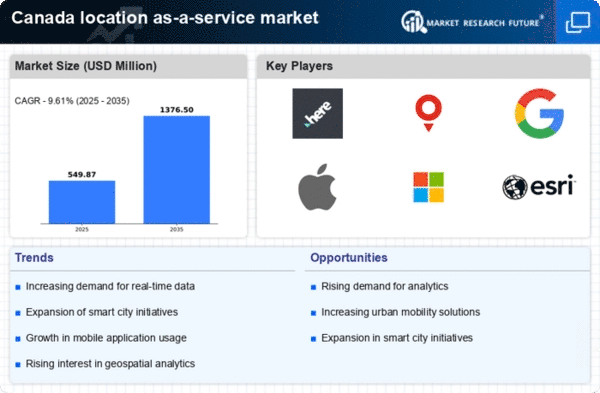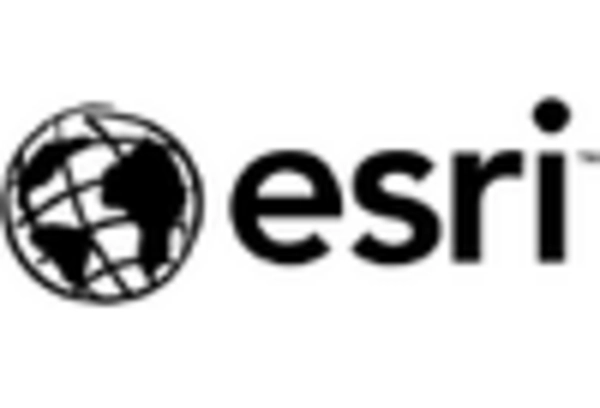Increased Adoption of IoT Devices
The proliferation of Internet of Things (IoT) devices is significantly influencing the location as-a-service market in Canada. With the growing number of connected devices, businesses are increasingly utilizing location services to track assets, monitor performance, and enhance customer engagement. The Canadian IoT market is expected to reach a valuation of $30 billion by 2026, indicating a robust growth trajectory. This trend is likely to drive demand for location-based services, as organizations seek to harness the power of IoT for operational efficiency. Consequently, the location as-a-service market is positioned to benefit from this increased adoption, providing solutions that integrate seamlessly with IoT ecosystems.
Advancements in Geospatial Technologies
Technological advancements in geospatial technologies are playing a crucial role in shaping the location as-a-service market in Canada. Innovations such as high-precision GPS, augmented reality, and machine learning are enhancing the capabilities of location-based services. These technologies enable businesses to analyze spatial data more effectively, leading to improved decision-making processes. The integration of geospatial analytics into various applications is expected to drive market growth, with estimates suggesting a potential increase in market size by over 20% in the coming years. As companies adopt these advanced technologies, the location as-a-service market is likely to witness a transformation, offering more sophisticated and tailored solutions to meet diverse customer needs.
Rising Demand for Real-Time Location Data
The location as-a-service market in Canada is experiencing a notable surge in demand for real-time location data. Businesses across various sectors, including retail, logistics, and transportation, are increasingly relying on accurate location information to enhance operational efficiency and customer experience. According to recent statistics, the market for location-based services is projected to grow at a CAGR of approximately 15% over the next five years. This growth is driven by the need for businesses to optimize their supply chains and improve service delivery. As organizations seek to leverage location intelligence, the location as-a-service market is poised to expand significantly, providing innovative solutions that cater to the evolving needs of Canadian enterprises.
Growing Focus on Enhanced Customer Experiences
The increasing emphasis on delivering enhanced customer experiences is driving the location as-a-service market in Canada. Businesses are recognizing the importance of personalized services and targeted marketing strategies that leverage location data. By utilizing location-based insights, companies can tailor their offerings to meet the specific needs of their customers, thereby improving satisfaction and loyalty. Market Research Future indicates that organizations that effectively utilize location intelligence can see a revenue increase of up to 25%. This focus on customer-centric approaches is likely to propel the location as-a-service market forward, as businesses seek to differentiate themselves in a competitive landscape.
Government Initiatives Supporting Location Services
Government initiatives aimed at promoting the use of location services are contributing to the growth of the location as-a-service market in Canada. Various federal and provincial programs are being implemented to enhance infrastructure and support the development of smart cities. These initiatives often include funding for technology adoption and the establishment of data-sharing frameworks. As a result, businesses are encouraged to invest in location-based solutions, which can lead to improved public services and urban planning. The location as-a-service market is likely to thrive under these supportive policies, fostering innovation and collaboration among stakeholders.
















